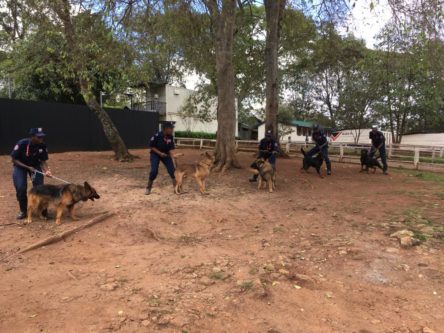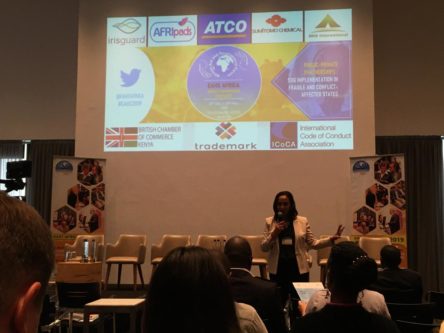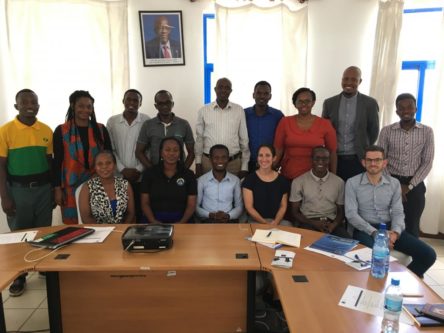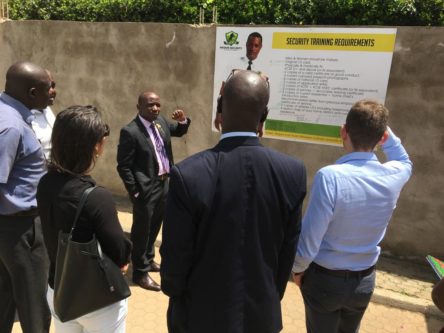MISIÓN ÁFRICA ORIENTAL 2019
Resumen
Gracias al generoso apoyo del Ministerio de Asuntos Exteriores y de la Commonwealth del Reino Unido, la segunda de una serie de misiones sobre el terreno en 2019 y 2020 tuvo lugar en octubre y noviembre de 2019 en África Oriental. La misión de dos semanas a Sudán del Sur, Kenia y Tanzania permitió al equipo de ICoCA reunirse con miembros actuales y potenciales de empresas de seguridad privada para evaluar su aplicación de los requisitos del Código, dar a conocer ICoCA entre los clientes de las empresas de seguridad y las organizaciones de la sociedad civil y reunirse con las autoridades reguladoras. La misión se benefició en gran medida del apoyo en el país de dos organizaciones de la sociedad civil, Usalama Reforms Forum, miembro de ICoCA, en Kenia, y WATED, en Tanzania.
El panorama del sector de la seguridad privada en África Oriental
Cada uno de los tres países visitados tiene un entorno operativo único. El sector de la seguridad privada de Sudán del Sur es pequeño en comparación con el número de efectivos militares y policiales. Con solo unas 20 empresas locales de seguridad privada y un puñado de empresas internacionales, el sector de la seguridad privada en Sudán del Sur se caracteriza por su carácter nacional, con clientes de la industria extractiva, la ONU, ONG, misiones diplomáticas y la policía sursudanesa.
En cambio, el mercado de la seguridad privada en Kenia ha experimentado un crecimiento sustancial en las dos últimas décadas y se calcula que ahora es unas cuatro veces mayor que los servicios policiales, militares y penitenciarios del país juntos. En Kenia operan más de 2500 empresas de seguridad privada, tanto locales como internacionales, que emplean a más de medio millón de guardias, lo que las convierte en el mayor empleador del país. Sin embargo, el sector es conocido por sus malas condiciones laborales, ya que muchas empresas pagan a sus empleados por debajo del salario mínimo. Entre sus principales clientes figuran empresas del sector extractivo, misiones diplomáticas, propiedades residenciales y ONG. Aunque Kenia cuenta con dos asociaciones de seguridad privada, la mayoría de las empresas de seguridad privada no son miembro de ninguna de estas asociaciones.
El sector de la seguridad privada en Tanzania también ha experimentado un enorme crecimiento en las dos últimas décadas, y en la actualidad operan en el país unas 1000 empresas de seguridad privada que dan empleo a unas 300 000 personas. Kenia y Tanzania están asimismo inmersas en la reforma del sector de la seguridad, si bien la primera está más avanzada en este proceso con la adopción de la Ley de regulación de la seguridad privada en 2016. Actualmente no está permitido que el personal de seguridad privada lleve armas de fuego en Kenia y, para la mayoría de las empresas, tampoco en Sudán, mientras que en Tanzania sí está permitido que el personal de seguridad privada lleve armas de fuego.
Reunión con empresas de seguridad privada
Durante la misión, miembros de la Secretaría de ICoCA se reunieron con seis empresas de seguridad, algunas de ellas miembros de ICoCA y posibles empresas miembros. Se celebraron reuniones con los equipos directivos para revisar las políticas y los protocolos. Se revisaron las prácticas y procedimientos de contratación y formación, y se prestó especial atención a las políticas y procedimientos en materia de explotación y abusos sexuales y violencia de género. Los miembros del equipo de ICoCA también se reunieron con una empresa de seguridad local del norte de Kenia para conocer mejor un innovador modelo de tutoría patrocinado por el cliente entre una empresa miembro de ICoCA y una empresa de seguridad local. La ICoCA presentó este modelo a los clientes de empresas de seguridad privada que también trabajan en el sector extractivo durante un reciente seminario web.

Visita de empresas miembros, Nairobi, noviembre de 2019
Compromiso de los clientes
Se celebraron reuniones individuales con clientes de empresas miembros en los tres países. Entre ellas había empresas, misiones diplomáticas, la ONU y otras organizaciones humanitarias. Además de estas reuniones bilaterales, ICoCA también asistió a una reunión del Consejo Asesor de Seguridad en el Extranjero (OSAC) en Juba y a la Conferencia Humanitaria de África Oriental en Nairobi, lo que mejoró la imagen de ICoCA ante muchas organizaciones humanitarias asistentes que contratan empresas de seguridad privadas.
 Conferencia Humanitaria de África Oriental, Nairobi
Conferencia Humanitaria de África Oriental, Nairobi
Talleres de organizaciones de la sociedad civil
Se organizaron dos talleres para dar a conocer mejor la Asociación y su labor, y profundizar en el conocimiento de las cuestiones en juego en la prestación de seguridad privada. En Nairobi se reunieron 18 organizaciones de la sociedad civil de toda África, incluidas organizaciones con sede en Kenia, Tanzania, Etiopía, Sierra Leona, Uganda, Ghana, Nigeria y Somalia. La reunión de Nairobi, que duró todo el día, incluyó la presentación de un estudio de referencia sobre el sector de la seguridad privada en Kenia realizado por Usalama Reforms y concluyó con una interacción entre las OSC y tres empresas miembros de seguridad privada. En Dar es Salaam, 10 organizaciones nacionales de la sociedad civil se reunieron para dar a conocer ICoCA y el Código, y WATED presentó un estudio de referencia sobre el sector de la seguridad privada en Tanzania.

Taller de las OSC, Dar es Salaam, noviembre de 2019
Reunión con las autoridades reguladoras en Tanzania y la Academia de formación en Kenia El equipo de ICoCA se reunió con el Comisionado de Policía de Operaciones y Formación de Seguridad Privada (IGP), que opera bajo el Ministerio del Interior en Tanzania.
Los representantes del IGP ofrecieron una visión general del entorno normativo de Tanzania en relación con los servicios de seguridad privada e informaron al equipo de ICoCA sobre los debates en curso acerca de una nueva ley que se está redactando para regular y supervisar el sector de la seguridad privada. La Academia de formación en seguridad privada (PSTA) colabora mano a mano con las autoridades keniatas para poner a prueba un nuevo plan de estudios. ICoCA visitó las instalaciones de la PSTA y recibió información sobre el plan de estudios que se está elaborando.

Visita a la Academia de formación de seguridad privada (PSTA), Nairobi, Kenia
Encontrará más fortos sobre la misión aquí.
